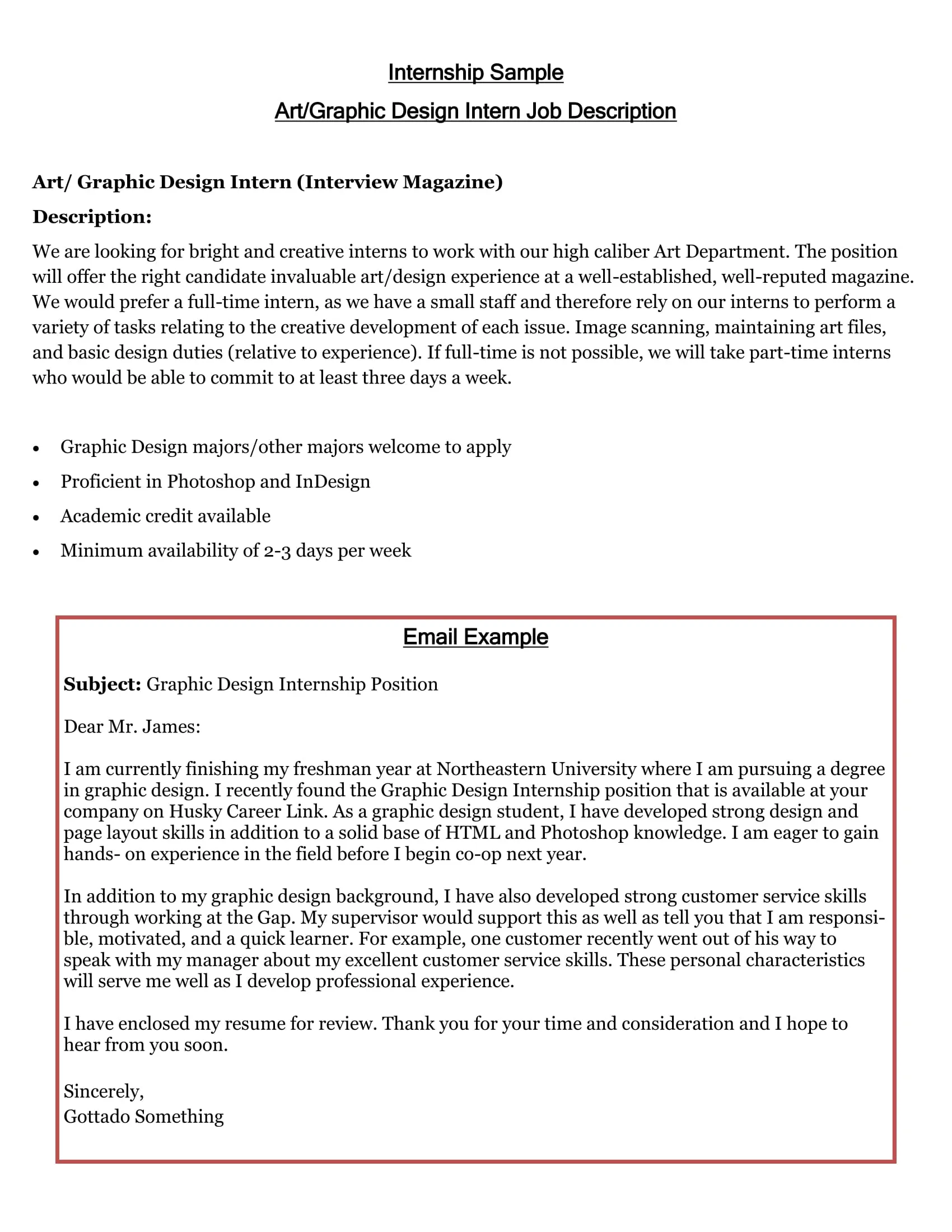What is an Internship Cover Letter
An internship cover letter is a crucial document that accompanies your resume when applying for an internship position. It serves as your first direct communication with a potential employer, allowing you to introduce yourself, highlight your relevant skills and experiences, and express your interest in the specific internship opportunity. Unlike a resume, which provides a factual overview of your qualifications, the cover letter offers a platform to showcase your personality, writing skills, and enthusiasm. It is your opportunity to demonstrate why you are the ideal candidate and why you are particularly interested in this specific internship program. A well-crafted cover letter is a powerful tool that can significantly increase your chances of getting selected for an interview.
Why is an Internship Cover Letter Important
The importance of an internship cover letter cannot be overstated. It provides a personalized introduction that a resume alone cannot achieve. It allows you to connect your skills to the specific requirements of the internship, showing the employer you understand their needs. A cover letter is a testament to your communication skills; it indicates your ability to write clearly, concisely, and persuasively. It also demonstrates your genuine interest in the company and the specific internship opportunity. By going the extra mile to write a cover letter, you show initiative and a willingness to invest time and effort, qualities that employers highly value. It can set you apart from other applicants who may only submit a resume, and give you the competitive edge.
Key Elements to Include in Your Internship Cover Letter
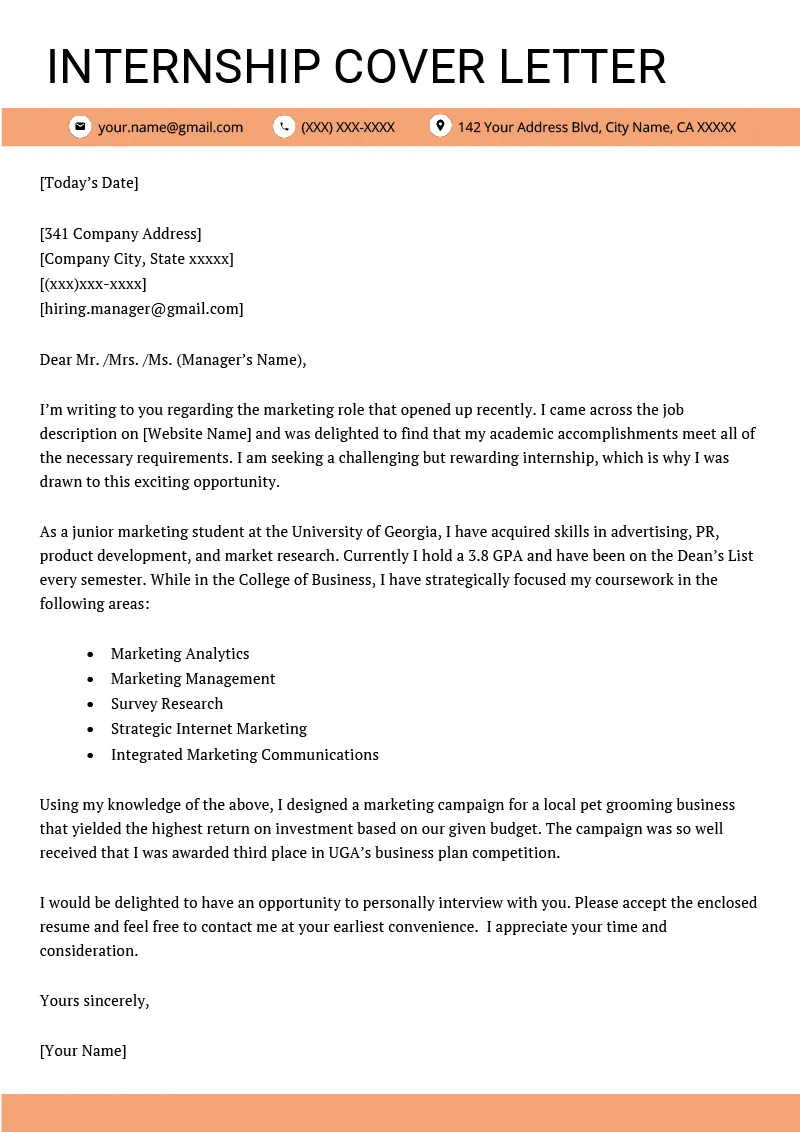
A compelling internship cover letter includes several key elements. You should start with a strong and professional salutation, addressing the hiring manager or the specific person in charge of the internship program by name whenever possible. The letter’s body should consist of several well-structured paragraphs. Begin by stating the position you are applying for and where you found the posting. Next, highlight your relevant skills and experiences, focusing on those that align with the internship’s requirements. Demonstrating your understanding of the company, its mission, and the internship’s purpose is also crucial. Finally, end with a compelling call to action, expressing your enthusiasm and willingness to follow up. Proofread meticulously before submitting.
Contact Information
At the top of your cover letter, provide your contact information. This typically includes your full name, phone number, email address, and possibly your LinkedIn profile URL or personal website if relevant. Ensure that your email address is professional and easy to read. The contact information should be clearly visible and formatted consistently. Also, include the date and the employer’s contact information, including the name of the hiring manager (if known), the company name, and the company’s address. This information ensures that your letter looks professional and easy to follow. This is the first impression you are making, so ensuring accuracy is vital.
Your Relevant Skills and Experience
Highlighting Your Achievements
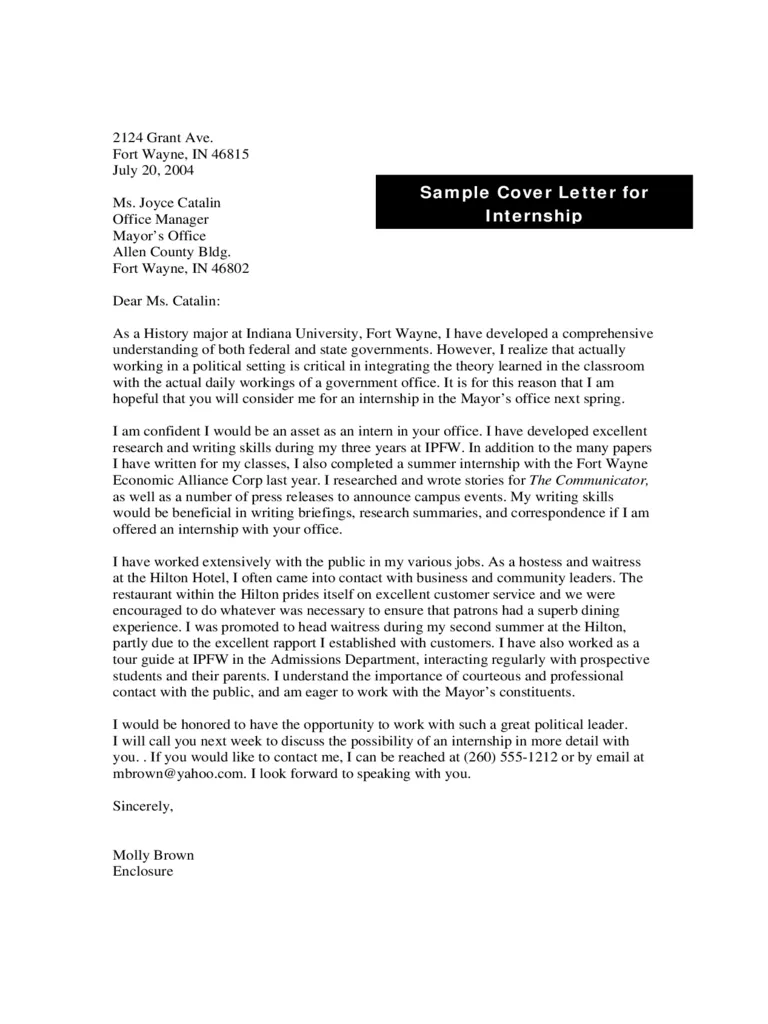
In the body of your cover letter, showcase your relevant skills and experience. Rather than just listing your past roles, emphasize what you accomplished in each position. Use the STAR method (Situation, Task, Action, Result) to describe your experiences and demonstrate your abilities. For example, instead of saying “I was responsible for social media,” you could say “In my role, I managed the company’s social media presence (Situation), and my task was to increase engagement (Task). I created and scheduled engaging content (Action), resulting in a 20% increase in follower engagement and brand visibility (Result).” Quantify your achievements whenever possible to give them more impact. This detailed approach demonstrates a strong understanding of how you made an impact, providing evidence of your abilities.
Company Research
Before writing your cover letter, conduct thorough research on the company and the specific internship program. Visit their website, read articles about the company, and explore their social media profiles. This will help you understand their mission, values, and recent projects. Tailor your cover letter to demonstrate your knowledge and genuine interest in their work. Mention specific aspects of the company that resonate with you, such as their innovative products, their commitment to sustainability, or their workplace culture. This level of research shows that you are serious about the opportunity and have taken the initiative to learn more, impressing the employer with your diligence.
Tailoring Your Letter to the Internship
Demonstrating Enthusiasm and Interest
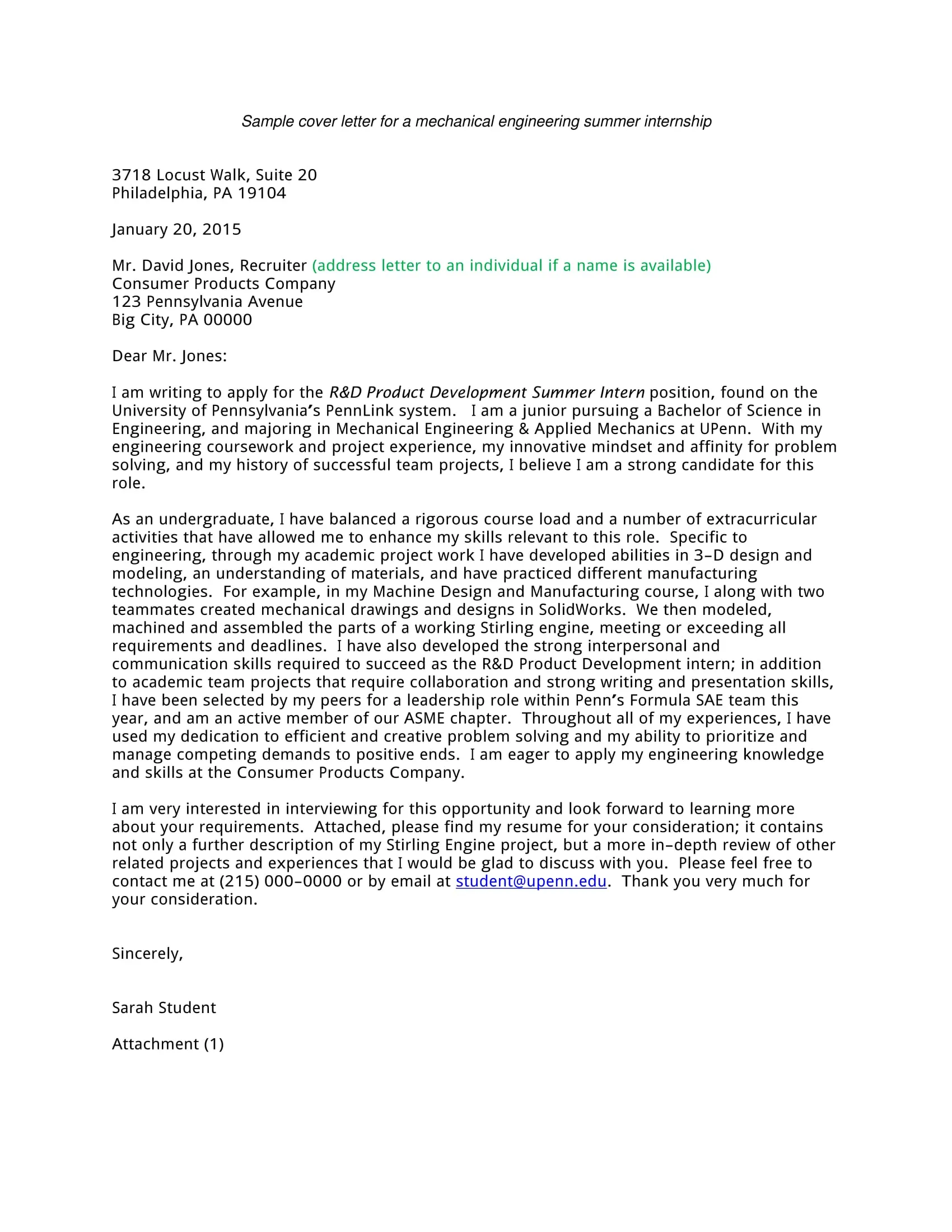
One of the most important parts of your cover letter is demonstrating your enthusiasm and interest in the internship. Clearly state why you are excited about the opportunity and what you hope to gain from it. Express your passion for the field or the industry, showing the employer that you are motivated and eager to learn. Mention specific projects, tasks, or aspects of the internship that particularly interest you. Tailor your letter to match the requirements and description of the internship, highlighting how your skills and experiences align with the responsibilities outlined. This personalization shows that you are not just sending a generic application but are genuinely invested in the role and company.
Formatting and Structure for Success
The formatting and structure of your cover letter are critical for readability and professionalism. Use a standard business letter format with a clear font, such as Times New Roman, Arial, or Calibri, in a size of 11 or 12 points. Use single spacing within paragraphs and a double space between paragraphs. Keep your cover letter concise, ideally no more than one page. Divide the content into clear and logical paragraphs. Use headings and bullet points where appropriate to break up large blocks of text and improve readability. Ensure the layout is clean and uncluttered, and that the overall presentation is visually appealing and easy to follow. Poor formatting can distract the hiring manager and negatively impact your impression.
Choosing the Right Font and Style
Select a professional and readable font for your internship cover letter. Avoid overly decorative or unusual fonts that could detract from the content. Common choices include Times New Roman, Arial, and Calibri, which are easy to read and project a sense of professionalism. Stick with a consistent font size, typically 11 or 12 points, and ensure that the font is consistently used throughout the entire document. Keep the style simple and clean. Avoid excessive use of bolding, italics, or underlining unless necessary for emphasis. The goal is to make the letter easy to read and visually appealing.
Proofreading and Editing Your Cover Letter
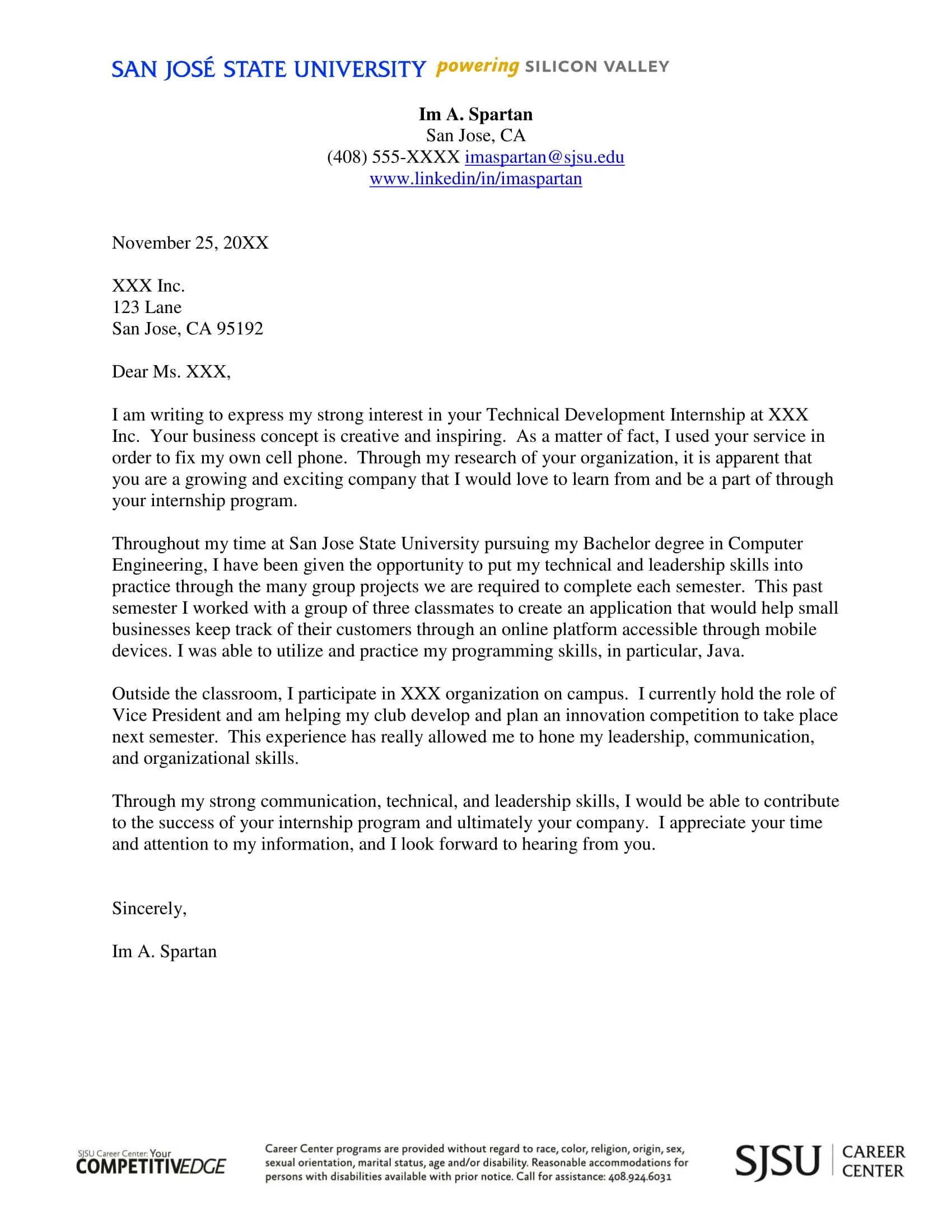
Proofreading and Editing Your Cover Letter
Before submitting your cover letter, proofread and edit it meticulously. Errors in grammar, spelling, and punctuation can create a negative impression and undermine your credibility. Use a grammar and spell-checking tool, but also read the letter multiple times to catch any errors that automated tools might miss. Ask a friend, family member, or career counselor to review your letter for feedback and identify any areas for improvement. Ensure that the tone of your letter is professional, respectful, and enthusiastic. A polished, error-free cover letter demonstrates attention to detail and professionalism, significantly enhancing your chances of success.
Examples of Strong Internship Cover Letters
Studying examples of strong internship cover letters can provide valuable insights into best practices. Look for examples that match the specific type of internship you are applying for and the industry. Analyze how successful cover letters are structured, the language used, and the skills and experiences highlighted. Note how the candidates demonstrate their understanding of the company and their enthusiasm for the role. Use these examples as a guide to help you craft your cover letter. However, avoid directly copying any part of those examples. Adapt and personalize the advice to reflect your unique background, experiences, and aspirations. By studying successful cover letters, you can learn how to effectively showcase your strengths and make a compelling case for your candidacy.
Common Mistakes to Avoid in Your Internship Cover Letter
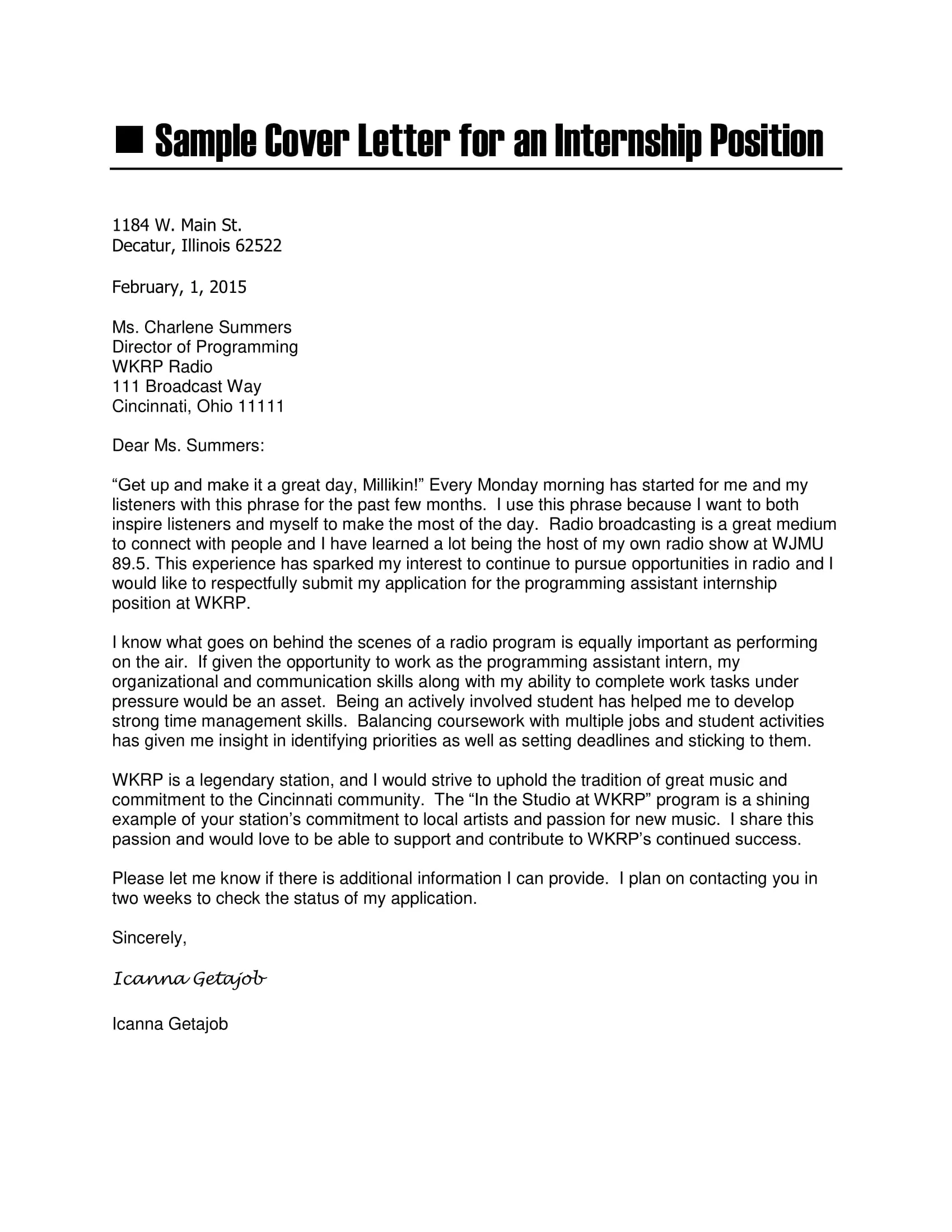
Avoid common mistakes that can diminish the effectiveness of your internship cover letter. One frequent error is failing to tailor the letter to the specific internship. Avoid generic, mass-produced cover letters; always customize your letter to match each role. Make sure that you address the hiring manager by name, and if you cannot find the name, research for it. Ensure you have not made any grammatical errors or typos. Avoid being overly formal. Be concise, direct, and enthusiastic without overusing these terms. Refrain from including irrelevant information or rehashing your resume; use the cover letter to expand on selected key experiences. Proofread carefully and consider the audience.
The Importance of a Strong Closing
The closing of your cover letter is an opportunity to leave a lasting impression. Reiterate your interest in the internship and the company. Express your enthusiasm to learn more about the opportunity and what you can contribute. Clearly state your willingness to follow up and provide your contact information, making it easy for the hiring manager to reach you. Use a professional closing, such as “Sincerely” or “Best regards,” followed by your full name. Thank the hiring manager for their time and consideration. A strong closing summarizes your key qualifications and confirms your eagerness to pursue the internship, increasing the likelihood of a positive response.
What to Do After Submitting Your Cover Letter
Once you have submitted your internship cover letter and resume, there are a few steps to take. Send a thank-you note to the hiring manager. Do this within 24 hours of submitting your application. Keep a copy of your application materials, including your cover letter and resume, for your records. Make sure to follow up on the status of your application about a week after applying. If you do not hear back, you may call or email the hiring manager to inquire about the status. This shows your interest in the role and your commitment to the opportunity. Be patient and persistent, and continue to apply for other internships as you await a response.
